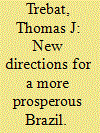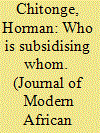|
|
|
Sort Order |
|
|
|
Items / Page
|
|
|
|
|
|
|
| Srl | Item |
| 1 |
ID:
121553


|
|
|
|
|
| Publication |
2013.
|
| Summary/Abstract |
This article examines whether increasing global confidence in Brazil is well founded and, if so, what the implications might be for the global community. Landmark political, economic, and social achievements in contemporary Brazil are reviewed as well as the obstacles to raise human welfare to developed country standards within the next decade. The paper concludes that Brazil's growing influence in the global community is based on sound empirical evidence, a diverse economy, and an emerging society; it is not the result of passing good fortune. At the same time, the crushing legacy of past problems in areas that are vital to human welfare, including the education system and deficiencies in innovation and technological advance, continues to weigh heavily. Depending on how well its leadership deals with the legacy of the past, Brazil could become a more important actor in the international community over the next ten years. Brazil's rising use of "soft power" will contribute to addressing global issues such as clean forms of energy, sustainability, food security, and social inclusion. Even for this possibility alone, Brazil merits much close attention from a global community not yet fully aware of Brazil's transformation.
|
|
|
|
|
|
|
|
|
|
|
|
|
|
|
|
| 2 |
ID:
101174


|
|
|
|
|
| Publication |
2010.
|
| Summary/Abstract |
This paper looks at the policy and practice of cross-subsidisation in the water sector, focusing on the Zambian experience. Setting a price for water services is a sensitive and controversial issue. Pricing water services below cost recovery can threaten the sustainability of the service and human welfare in the long term, while water pricing at full cost recovery often restricts access to water services for poor households, compromising their well-being. This paper looks at one of the approaches that policy makers use in an attempt to balance the trade-offs - cross-subsidisation. Lessons from the experience of implementing the cross-subsidy policy in Zambia are identified and discussed. This paper argues that while the objectives behind the cross-subsidisation policy are clear, the results from the implementation of this policy are, at best, unclear. The Zambian experience shows that for an indirect subsidy, such as cross-subsidisation (as opposed to a direct subsidy), to generate positive results, a careful consideration of the actual context in which the policy is to be implemented must be a precondition to its implementation.
|
|
|
|
|
|
|
|
|
|
|
|
|
|
|
|
|
|
|
|
|